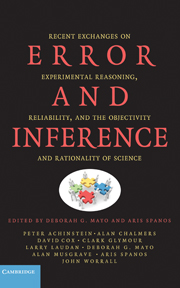 Error and Inference
Error and Inference Book contents
- Frontmatter
- Contents
- List of Contributors
- Preface
- Introduction and Background
- 1 Learning from Error, Severe Testing, and the Growth of Theoretical Knowledge
- 2 The Life of Theory in the New Experimentalism
- 3 Revisiting Critical Rationalism
- 4 Theory Confirmation and Novel Evidence
- 5 Induction and Severe Testing
- 6 Theory Testing in Economics and the Error-Statistical Perspective
- 7 New Perspectives on (Some Old) Problems of Frequentist Statistics
- 8 Causal Modeling, Explanation and Severe Testing
- 9 Error and Legal Epistemology
- Index
- References
9 - Error and Legal Epistemology
Published online by Cambridge University Press: 29 January 2010
- Frontmatter
- Contents
- List of Contributors
- Preface
- Introduction and Background
- 1 Learning from Error, Severe Testing, and the Growth of Theoretical Knowledge
- 2 The Life of Theory in the New Experimentalism
- 3 Revisiting Critical Rationalism
- 4 Theory Confirmation and Novel Evidence
- 5 Induction and Severe Testing
- 6 Theory Testing in Economics and the Error-Statistical Perspective
- 7 New Perspectives on (Some Old) Problems of Frequentist Statistics
- 8 Causal Modeling, Explanation and Severe Testing
- 9 Error and Legal Epistemology
- Index
- References
Summary
Introduction
In any sophisticated system of inquiry, we expect to find several features intimately tied to questions of error and error avoidance. Above all, we want a system (1) that produces relatively few erroneous beliefs (without resort to the skeptical gimmick of avoiding error by refusing to believe anything) and (2) that, when it does make mistakes, commits errors that tend to be of the less egregious kind than of the more egregious kind (supposing that we can identify some error types as more serious than others). Finally, (3) we want to have mechanisms in place with the capacity to eventually identify the errors that we have made and to tell us how to correct for them. In short, we want to be able to reduce errors, to distribute those errors that do occur according to our preferences, and to have a self-correction device for identifying and revising our erroneous beliefs. This is, of course, an unabashedly Peircean view of the nature of inquiry, although one need not be (as I confess to being) a card-carrying pragmatist to find it congenial.
Most of the papers in this volume deal with the problem of error as it arises in the context of scientific research. That approach is fair enough because most of us are philosophers of science.
- Type
- Chapter
- Information
- Error and InferenceRecent Exchanges on Experimental Reasoning, Reliability, and the Objectivity and Rationality of Science, pp. 376 - 410Publisher: Cambridge University PressPrint publication year: 2009


